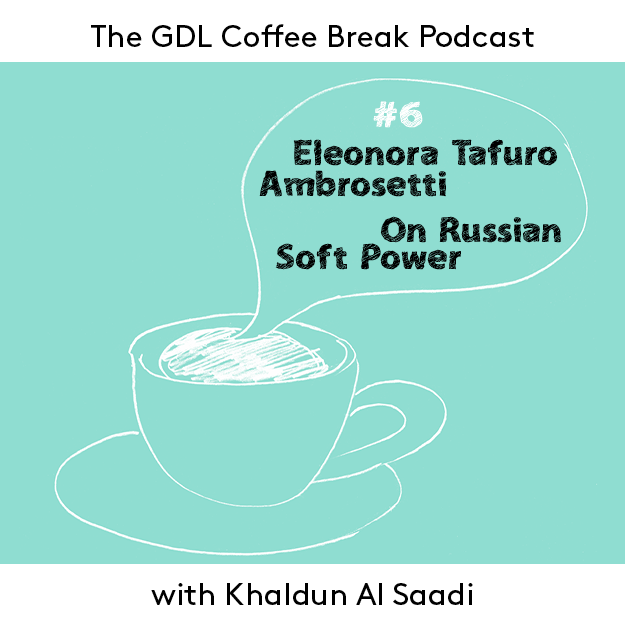Blog
Coffe Break Podcast: Eleonora Trafuro Ambrosetti on Russian Soft Power
In this episode, Khaldun Al Saadi focuses on Putin’s ongoing war of aggression in Ukraine and Russian Soft Power. Today’s guest is Eleonora Tafuro Ambrosetti, who is a research fellow at the Russia, Caucasus, and Central Asia Centre at ISPI (Italian Institute For International Political Studies). Currently, Eleonora is concentrating on Russian Foreign Policy and Soft Power, EU-Russia and Russia-Turkey relations as well as EU neighborhood policies. Just recently, she published a paper on Russian Soft Power Sources at the South African Institute of International Affairs that you can find here. Prior to working at the ISPI, she completed her PhD at the Middle East Technical University (METU) in Ankara, Turkey, and is a Marie Curie Fellow.
Additionally, Eleonora is a member of the WIIS (Woman in International Security), an international network dedicated to increasing the influence of women in the field of foreign and defense policy. She is not only fluent in Italian, her native language, but also speaks English, French, and Spanish fluently. Currently, she has been working on expanding her Russian and Turkish language skills as well.
Since Eleonora is covering such a wide range of Asian counties in her field of work, the war in Ukraine has immensely impacted her work schedule and focus. The Idea of Soft Power in the Russian Regime is contrasting to Soft Power in the context of liberate Democracies, such as the US and EU. In that frame, Joseph Nye would describe Soft Power as a way of exercising power which is based on cogency and attractiveness, without the usage of coercive measurements. Though that is correct for the US and EU, Eleonora has noticed some differences when getting more into the use of Soft Power in Russia.
Russian Narrative as an Alternative Pole of Power
Russia seems to make use of narratives that construct an attractive image of itself towards other countries and social groups. The most prominent example of that could be anti-Westernism and Russia’s image as an alternative pole of power that is promoting more conservative values. That approach is accompanied by presenting weaknesses of the Western societies and holding them, or particularly NATO, accountable for the current war in Ukraine. Therefore, the usage of Soft Power in Russia seems to be more government-driven and is mainly seeking more influence while also exploiting societal differences to the West. Eleonora explains that this image as an opposer to the West especially appeals to already anti-American countries in the global south and the African continent, as well as far right and far left society groups.
Western Identities as Main Strength in opposing Russia
In response to the question about what governments can do to interfere with Russia’s projection of Western societies, Eleonora emphasises that the US and EU should focus on their main strength: their own identities. Both societies represent values like fairness, diversity, wealth and most importantly, the rule of law. By investing more in those values and presenting themselves as a more positive model, Eleonora sees a chance to counter Russia’s use of Soft Power. The EU’s main asset is their political capacity building, as it is not seen as a security provider like Russia, but more like an economic model. Eleonora also adds that Putin’s current war of aggression in Ukraine was heavily impacted by this completion of the different world models, as this war has technically already started in 2014.
Increased Effort in Peace Buidling and Dialogue as Potential Silver Lining
As a closing question, Khaldun wants to know what gives Eleonora hope in those times of war. Since Eleonora currently doesn’t see a lot of improvements regarding peace negotiations and has many friends both in Ukraine and Russia that are affected by the war, she currently isn’t very optimistic. What does give her hope is that the Putin’s war of aggression seems to draw a lot of international attention, that will hopefully lead to more effort towards peace building and peace dialogue. However, she adds that there might be a risk that the attention could shift away from Putin’s war of aggression and that people could forget about it eventually. She emphasises that peace is mainly in the hands of the Ukrainian and especially Russian president.
New episodes of the podcast are released every three weeks. Host Khaldun seeks to get an inside look at the perspectives of young diplomats, experts, and activists on the vast array of global challenges we face today by sitting down with them for a virtual cup of coffee.
To learn about the answers please make yourself a cup of coffee and listen to the new episode on Spotify or Apple Podcasts!
About the authors:
Eleonora Trafuro Abrosetti is a research fellow at Russia, Caucasus, and Central Asia Centre at ISPI. Her areas of interest include Russian foreign policy and soft power, EU-Russia and Russia-Turkey relations, and EU neighbourhood policies.
Khaldun Al Saadi is a project coordinator with strong experience and interests in the fields of immigration, equality, integration and radicalization prevention.
Published on January 12, 2023.
Visual Credit: Julie August
